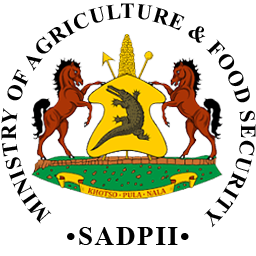
In the quiet highlands of ‘Moteng in the Botha Bothe district of Lesotho, a quiet yet impactful movement is taking shape driven by bees and big dreams. At the center of this transformation is a youth named Malefetsane Makhabane, the visionary founder of a legally registered company Makhabane Beekeeping.
Makhabane’s journey began with just two bee boxes, provided by the Ministry of Forestry, along with basic training in bee production. For many, that might have been a modest start but for Makhabane, it was the spark of a much bigger dream. Driven by what he describes as a burning desire, he pushed himself to grow beyond the initial support. He increased his hives to 52, which allowed him to harvest 500 litres of honey.
But as his honey started to flow, so did the demand. It quickly became clear that 500 litres a year would never be enough to meet the needs of his growing customer base. That’s when Makhabane realized he needed more than determination he needed financial support.
SADP II interference
Still hustling to expand, he connected with SADP II (Smallholder Agriculture Development Project II), a partnership that proved transformative. Through SADP II, Makhabane Beekeeping received a full suite of professional beekeeping tools and equipment, 130 beehives, manual and electric extractors, protective clothing, and a range of essential tools like smokers, hive tools, wax sheets, and queen excluders.
With this intervention, production skyrocketed. From 500 litres annually, the company now produces an impressive 9,600 litres of honey per year from 148 colonized hives. Makhabane now conducts two harvests annually, from January to April and again from September to November, ensuring consistent supply and market presence.
To bring his honey directly to consumers, Makhabane secured a small retail cubicle in a shopping complex in Botha Bothe, where all their natural, locally produced honey products are sold. What began as a backyard experiment had now become a fully operating enterprise with growing local recognition.
Prospects for the company
Makhabane’s dreams extend far beyond selling honey. He envisions a future where every household in his community owns at least one beehive. This isn’t just about honey it’s about improving pollination, increasing crop yields, enhancing nutrition, and creating micro-income opportunities. As he explains, “One teaspoon of honey contains all types of food.”
His commitment to community is more than just words. He has entered into an agreement with the local police station, offering to place 20 to 30 hives on their premises. In return, the community police (Mahokela) will receive 40% of the honey, as compensation for their voluntary community work. It’s a sustainable, win-win model empowering volunteers while increasing hive coverage.
Beyond partnerships, Makhabane has taken it upon himself to mentor local youth, teaching them not only the technical aspects of beekeeping but also the importance of caring for the environment. Through education and example, he is cultivating a generation of entrepreneurs.
Looking ahead, Makhabane is focused on scale. He already owns a site capable of housing up to 20,000 hives and plans to develop it into a thriving bee habitat. His dream is to take Lesotho’s honey to international markets, positioning it as a premium, organic product that reflects the purity of the mountain landscape it comes from.
Reflecting on his journey, Makhabane speaks with pride. “Makhabane Beekeeping has grown gradually to this date,” he says. “We’ve created five permanent jobs, and we are just getting started.”
Conclusion
Reflecting on his journey, Makhabane speaks with pride. “Makhabane Beekeeping has grown gradually to this date,” he says. “We’ve created five permanent jobs, and we are just getting started.”
His call to action is clear, if every household had just one beehive, jobs would be created, nature would be preserved, and rural economies could thrive. The honey market, he insists, is still wide open and he invites women and youth especially to join him in this sweet journey.

Honey shop in Botha Bothe District



